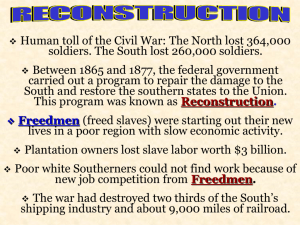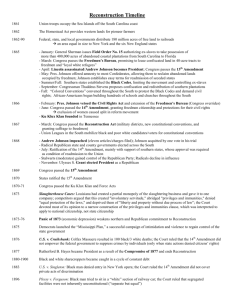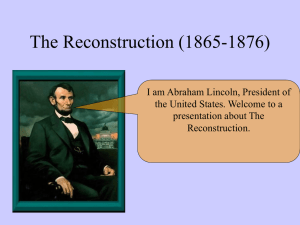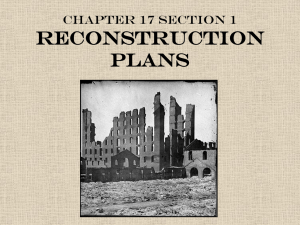Chapter 22 Powerpoint - Ector County Independent School District
advertisement
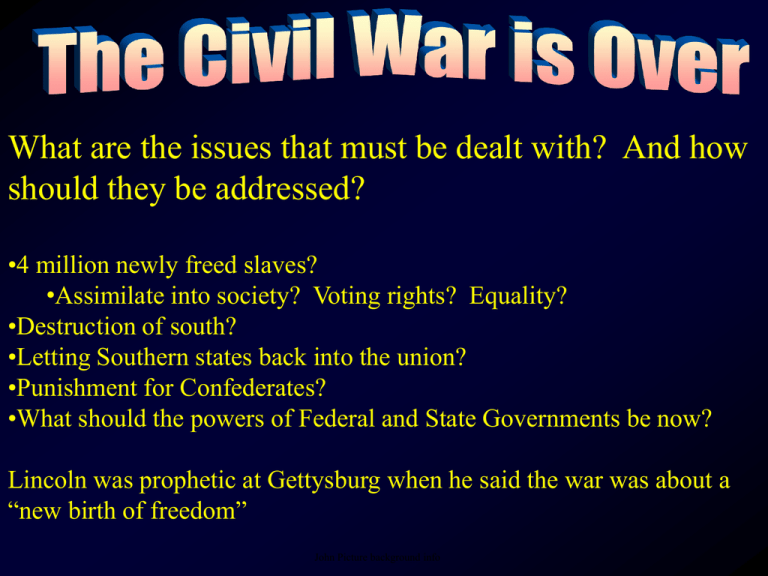
What are the issues that must be dealt with? And how should they be addressed? •4 million newly freed slaves? •Assimilate into society? Voting rights? Equality? •Destruction of south? •Letting Southern states back into the union? •Punishment for Confederates? •What should the powers of Federal and State Governments be now? Lincoln was prophetic at Gettysburg when he said the war was about a “new birth of freedom” John Picture background info South after war 1 Human toll of the Civil War: The North lost 364,000 soldiers. The South lost 260,000 soldiers. Between 1865 and 1877, the federal government carried out a program to repair the damage to the South and restore the southern states to the Union. This program was known as Reconstruction. Freedmen (freed slaves) were starting out their new lives in a poor region with slow economic activity. Plantation owners lost slave labor worth $3 billion. Poor white Southerners could not find work because of new job competition from Freedmen. The war had destroyed two thirds of the South’s shipping industry and about 9,000 miles of railroad. Lincoln’s speech “With malice toward none; with charity for all; with firmness in the right, as God gives us to see the right, let us strive on to finish the work we are in; to bind up the nation’s wounds….to do all which may achieve and cherish a just and a lasting peace, among ourselves, and with all nations.” Lincoln was assassinated before we would ever know what his full reconstruction plan would be Lincoln’s speech What we know- in 1863 he made a reference to his 10% reconstruction plan which included: •10% of people who could vote in 1860 had to swear allegiance to the union to become a state •States had to create a new state government which had to approved at the Federal level •States had to obey all emancipation laws Of course, this is only a shell of a plan but we know Lincoln would have shown mercy on the South Lincoln’s speech Republicans were upset about the leniency he proposed, so congress passed the Wade-Davis Bill (1864): •50% of people who could vote in 1860 had to swear allegiance to the union to become a state •States had to create a new state government which had to approved at the Federal level- only people who had never served or aided the Confederacy could be in politics •States had to obey all emancipation laws with stronger safeguards to protect this Lincoln’s speech Republicans subscribed to the “state suicide theory”- when south seceded, they essentially committed suicide and were not a part of the Union, therefore they should be treated as a conquered province Lincoln disagreed and said they had never actually left the Union and he vetoed the Wade-Davis bill Republicans responded by refusing to seat delegate from Louisiana who had met Lincoln’s 10% requirement The war over reconstruction was already on! •Supported Lincoln’s plan for leniency towards the South •Even before Lincoln died, a group of congressmen called the Radical Republicans were pushing for punishment of the South •Engaged in a power struggle with Congress over who would lead the country through Reconstruction. •Would be impeached but not removed from office. John Picture background info Johnson’s plan to readmit the South: Amnesty: pardoned many ex-confederates •Rebels sign an oath of allegiance •Once 10% of the population signs, state can be readmitted •Even some high ranking Confederate officials, provided they weren’t worth more than $20,000 Write new state Constitutions •approve the 13th Amendment (Banned slavery) •reject secession and state’s rights •submit to U.S. Government authority •The South was clearly going to be run by middle and lower class whites “Neither slavery nor involuntary servitude, except as a punishment for crime, whereof the party shall have been duly convicted, shall exist within the United States, or any place subject to their jurisdiction.” The Congress shall have power to enforce by appropriate legislation, the provisions of this article. 13th: Slavery14th Abolished Johnson’s plan to readmit the South: No mention of •Education for freedmen •Citizenship and voting rights for freedmen •Radicals were not happy- saw Johnson as a Southerner and a confederate (he had owned slaves at one time) •Many former confederates return to power (old power structure returning?) •Alexander Stephens (VP of Confederacy) elected senator from GA •Black codes (see next slides) passed to establish white authority •Violence against blacks in South (KKK formed) As southern states were restored to the Union under President Johnson’s plan, they began to enact black codes, laws that restricted freedmen’s rights. The black codes established virtual slavery with provisions such as these: Curfews: Generally, black people could not gather after sunset. Vagrancy laws: Freedmen convicted of vagrancy– that is, not working– could be fined, whipped, or sold for a year’s labor. Labor contracts: Freedmen had to sign agreements in January for a year of work. Those who quit in the middle of a contract often lost all the wages they had earned. Land restrictions: Freed people could rent land or homes only in rural areas. This restriction forced them to live on plantations. Most became sharecroppers Couldn’t serve on juries or testify against whites; only real change was marital rights were granted Mississippi Governor, 1866: “The Negro is free” “Whether we like it or not; we must realize that fact now and forever. To be free, however, does not make him a citizen or entitle him to social or political equality with the white man.” Gov of Miss St. Landry’s Parish, Louisiana, 1865 Section 1: Be it ordained by the police jury of parish of St. Landry, That no negro shall be allowed to pass within the limits of said parish without a special permit in writing from his employer. Whoever shall violate this provision shall pay a fine of $2.50, or in default thereof shall be forced to work four days on the public road or suffer corporeal punishment. St. Landry’s Parish, Louisiana, 1865 Section 2: Be it ordained: That every Negro who shall be found absent from the residence of his employer after 10 o’clock at night, without a written permit from him employer, shall pay a fine of $5.00, or in default thereof, shall be compelled to work 5 days on the public road or suffer corporeal punishment. St. Landry’s Parish, Louisiana, 1865 Section 3: Be it further ordained, That no Negro shall be be permitted to rent or keep a house within said parish. Any Negro violating this provision shall be immediately ejected and compelled to find an employer; and any who shall rent, or give the use of the any house to any Negro, in violation of this section, shall pay a fine of $5.00 for each offence. St. Landry’s Parish, Louisiana, 1865 Section 4: Be it further ordained, No Negroes shall be allowed to congregate in public meetings between the hours of sunset to sunrise and by special permission of the police chief may a public meeting of Negroes occur. However, church services are not included in this law. Pay a fine of $5.00, work 5 days on the road crew or receive corporeal punishment St. Landry’s Parish, Louisiana, 1865 Section 5: Be it ordained, No Negro who is not in the military service shall be allowed to carry firearms, or any kind of weapons, within said parish, without the special written permission of his employers. Subject to $5.00 fine, road work or corporeal punishment. St. Landry’s Parish, Louisiana, 1865 Section 6: Be it ordained, That it shall be the duty of every citizen to act as a police officer for the detection of offences and the apprehension of offenders, who shall be immediately handed over to the proper police officer or captain. Charles Summner Thaddeus Stevens •Radical republicanism was a reaction to white supremacy- not necessarily to punish the South •Advocated political, social and economic equality for the Freedmen. •Would go after President Johnson through the impeachment process after he vetoes the Civil Rights Act of 1866. Radical Republicans Thaddeus Stevens Charles Summner •Blocked Southerners from entering congress in Dec. 1865 •Free black population would increase southern representation by 12- too much power •Feared southerners and Northern Democrats would unite and control Government •Federal black codes? •President Johnson vetoed the Civil Rights Act of 1866 •Gave $$$$ to Freedmen’s Bureau for schools and granted citizenship to the Freedmen •Congress believed Johnson was working against Reconstruction and overrode his veto. •Congress would override his veto often and basically took over the Govt. An inflexible President, 1866: Republican cartoon shows Johnson knocking Blacks of the Freedmen’s Bureau by his veto. Johnson’s Veto •Led to the 14th Amendment “All persons born in the U.S. are citizens of this country and the state they reside in. No state shall make or enforce any law which deprives any person of life, liberty, or property, without due process of law, nor deny to any person within its jurisdiction to the equal protection of the laws.” The Congress shall have power to enforce by appropriate legislation, the provisions of this article. 14th 14th: Rights of Citizens •Also included were clauses that reduced the number of representatives and electoral votes from a state if they deny citizenship and voting rights •Disqualified all former confederate officeholders from holding federal or state office •Johnson campaigned against it and all southern states rejected it- temporarily put on hold 14th 14th: Rights of Citizens •Women rights supporters refused to support the 14th Amendment giving African American Men citizenship unless women were added to it. •Abolitionists would not support women’s rights Abolitionists vs Women’s rights Impeachment: Bringing charges against the President. Two steps involved…… 1st Step: U. S. House of Representatives hold hearings to decide if there are crimes committed. They then vote on the charges and if there is a majority, then, charges are brought against the President. 2nd Step: U.S. Senate becomes a courtroom. The President is tried for the charges brought against him. The Chief Justice of the Supreme Court is the judge. Once trial is completed, Senators must vote to remove President with a 2/3’s vote. Impeachment process Brought up on 11 charges of high crimes and misdemeanors. Tenure in Office Act: Law Congress passed. President can’t fire any of his cabinet members without consulting Congress. Presidency would suffer as Passed to provoke a result of this failed Johnson impeachment. fired Edwin Stanton President would be more of Missed being removed a figure-head. from office by 1 vote Saved the separation of powers of 3 branches govt. Who was the only other president to be impeached? Once Johnson is impeached, Congress passes Reconstruction Act of 1867. The South would be reconstructed under the Radical Republicans plan. Republicans would elect Grant as their President and he would carry out the Radical Reconstruction. “The Strong Government”, 1869-1877. Grant enforcing the Reconstruction Act of 1867 and “forcing” the South to change. Plans compared Reconstruction Acts of 1867--76 (Harsh) •oath of allegiance---50% •No high ranking Confederate officials •lose voting rights if you don’t sign oath •Write new state Constitutions with full suffrage •Ratify: 13, 14 & 15 Amendments •reject secession and state’s rights •submit to U.S. Government authority •Freedmen’s Bureau to be paid for by states •Divide the South into 5 military districts- policed by Union army “The right of citizens of the United States to vote shall not be denied or abridged by the United States or by any State on account of race, color, or previous condition of servitude”. The Congress shall have power to enforce this article by appropriate legislation. 14th 15th: Voting Rights The Taste of Freedom Freedom of movement: Enslaved people often walked away from plantations upon hearing that the Union army was near. Exodusters: moved to Kansas and Texas Freedom to own land: Proposals to give white-owned land to freed people got little support from the government. Unofficial land redistribution did take place, however. Freedom to worship: African Americans formed their own churches and started mutual aid societies, debating clubs, drama societies, and trade associations. Freedom to learn: Between 1865 and 1870, black educators founded 30 African American colleges. First Black Senators and representatives in the 42st and 42nd Congress. Senator Hiram Revels, on the left was elected in 1870 to replace the seat vacated by Jefferson Davis. Black Congressmen 1865, Congress created the Freedman’s Bureau to help former slaves get a new start in life. This was the first major relief agency in United States history. Bureau’s Accomplishments Built thousands of schools to educate Blacks. Former slaves rushed to get an education for themselves and their children. Education was difficult and dangerous to gain. Southerners hated the idea that Freedmen would go to school. Freedmen’s Bureau 3 Freedmen’s Bureau 4 Funding Reconstruction Rebuilding the South’s infrastructure, the public property and services that a society uses, was one giant business opportunity. Roads, bridges, canals, railroads, and telegraph lines had to be rebuilt. Funds were also needed to expand services to southern citizens. Following the North’s example, all southern states created public school systems by 1872. Congress, private investors, and heavy taxes paid for Reconstruction. Spending by Reconstruction legislatures added another $130 million to southern debt. New South New South •Becomes industrialized •Cities rebuilt •Railroads •Schools, over a thousand •Hospitals, 45 in 14 states •Diversify economy. Military Reconstructio n Each number indicates the Military Districts


